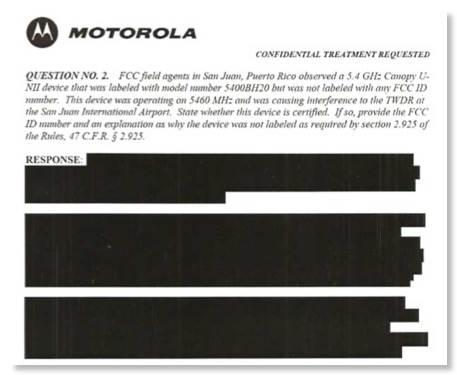FOIA @ FCC: Is CIA More Liberal?
Redacted version of FCC document received from a FOIA request
Based on your blogger’s recent encounter with FCC on FOIA issues, it is interesting to see how FCC practice compares with other agencies.
If you want a datapoint on the issue of whether FCC over-redacts documents under FOIA, compare the redactions of the Motorola document to this document, originally Top Secret, but released recently by CIA with redactions.
You can see that FCC is more aggressive with redactions than CIA is!
The FOIA legislation has the following provision (5 U.S.C. 552(b))
Any reasonably segregable portion of a record shall be provided to any person requesting such record after deletion of the portions which are exempt under this subsection. The amount of information deleted, and the exemption under which the deletion is made, shall be indicated on the released portion of the record, unless including that indication would harm an interest protected by the exemption in this subsection under which the deletion is made. If technically feasible, the amount of the information deleted, and the exemption under which the deletion is made, shall be indicated at the place in the record where such deletion is made.
As is clear from the FCC redaction shown above, and even the lesser redactions I received after an appeal to the Commission for review that took almost a year, the Commission has an “unusual” reading of this law. It is hard to imagine why anyone thought the whole text of the above Motorola response was FOIA exempt, especially when you see what it actually said.
Note that the law requires “Any reasonably segregable portion of a record shall be provided to any person requesting such record after deletion of the portions which are exempt under this subsection”. It also requires “If technically feasible, the amount of the information deleted, and the exemption under which the deletion is made, shall be indicated at the place in the record where such deletion is made.” (Emphasis added) Clearly the second requirement was never met and it is dubious that the first requirement was met in this case. However, a review of the formerly Top Secret CIA document shows that the CIA is much closer to compliance than FCC. Why?
We note also that the CIA has a Freedom of Information Act Electronic Reading Room where it posts documents that have been released. FCC has no such information on its voluminous website.
We note also that the Nuclear Regulatory Commission posts on its website both Recent FOIA Requests as well as closed FOIA requests that include the documents released.
FCC appears to have on its web site “Records disclosed in response to a FOIA request that ‘the agency determines have become or are likely to become the subject of subsequent requests for substantially the same records’”, HOWEVER this section is mainly links to other FCC databases and the only real information released under FOIA consists of 3 documents dealing with the investigation of Google’s collection of Wi-Fi data. No other FOIA-released data is available on the website as it is at CIA and NRC. Why?
So FCC appears to have at best a minimal policy of compliance with the FOIA legislation. In view of FCC’s claim of being very transparent, it is puzzling why this is true. This appears to be a longstanding issue at FCC that predates the current leadership, although the current leadership is not making it any better.
UPDATE
FBI may also be more liberal. FBIA documents released under FOIA are available in The Vault. See for yourself how FBI appears to redact with a lighter hand than FCC. Where do FCC documents released under FOIA go? Perhaps to the same black hole as pending petitions at FCC?
FBI’s FOIA site even has video. For example:
Christopher Metsos' brush pass with official from Russian Mission in New York, 5/16/ 2004.




![Validate my RSS feed [Valid RSS]](valid-rss-rogers.png)

